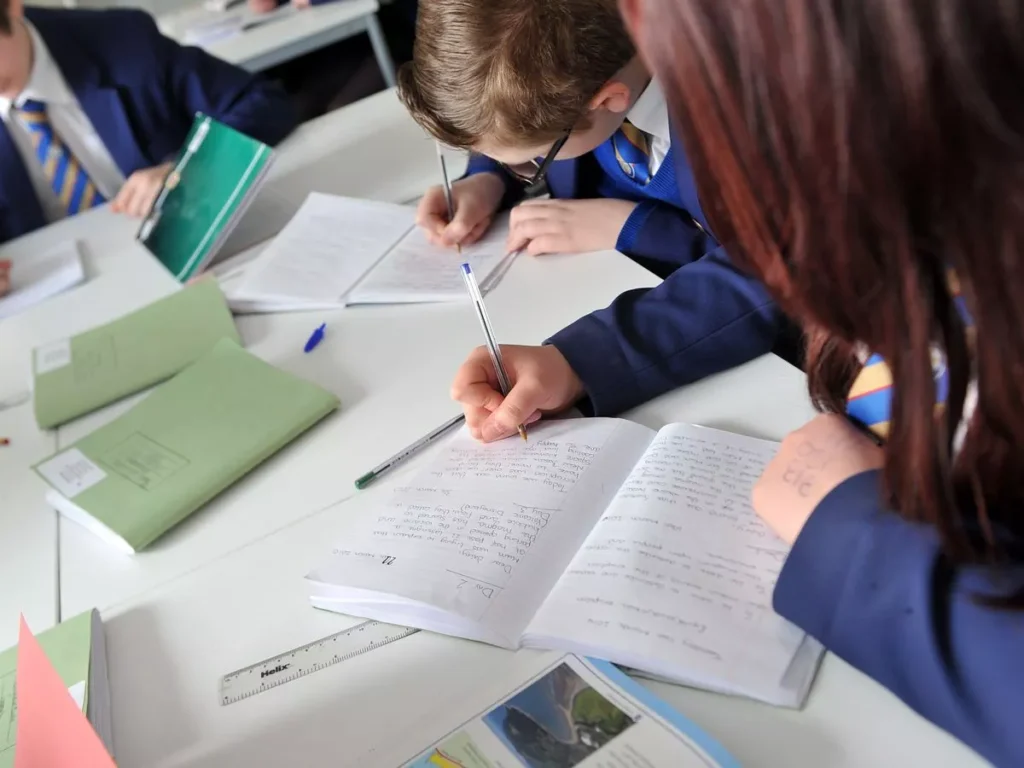No, failing your GCSEs does not mean your life is over. While they are important, there are alternative routes and options available. You can explore vocational qualifications, consider further education at colleges, or gain practical skills and experience through work or volunteering.
So, it’s crucial to reassess your goals, seek professional support, and focus on personal growth and resilience. Many successful individuals have faced setbacks and found alternative paths to achieve success.
Remember, your life is a journey with multiple opportunities for growth and achievement beyond academic challenges
What Is The Importance of GCSEs?

GCSEs, or General Certificates of Secondary Education, do 14-16-year-olds take crucial qualifications in England, Wales, and Northern Ireland. Their importance is multifaceted:
Foundation for Further Education: Serving as fundamental stepping stones, GCSEs establish a robust foundation in core subjects like English, mathematics, and science, laying the groundwork for future academic pursuits such as A-Levels, university degrees, and vocational training.
Gateway to Career Paths: It acts as a gateway to diverse career paths. Strong grades in relevant subjects open avenues to apprenticeships, traineeships, and entry-level jobs, directly influencing career trajectories in fields ranging from healthcare to finance.
Development of Essential Skills: It studies foster critical life skills beyond academic knowledge. Students cultivate abilities in critical thinking, problem-solving, communication, and teamwork, enhancing their readiness for challenges in various aspects of life.
Confidence and Self-Esteem: Attaining commendable GCSE grades provides a confidence boost, affirming students’ capabilities for hard work and academic success. This newfound confidence serves as motivation for continued education and the pursuit of personal and professional goals.
Shaping Future Opportunities: It results wield significant influence over future opportunities. Good grades can lead to scholarships, bursaries, and admission to prestigious universities. Even for those opting not to pursue higher education, strong GCSEs enhance employability and provide a valuable head start in chosen career paths.
Mastering Your GCSEs: A Comprehensive Preparation Guide
Facing GCSEs may seem like a daunting task, but with a strategic approach, conquering your exams becomes achievable. Here’s a comprehensive guide to help you navigate the journey:
Planning and Organization:
- Create a revision timetable: Tailor it to subjects, exam dates, and your learning style. Prioritize challenging topics.
- Gather resources: Organize notes, textbooks, past papers, and online resources for easy access.
- Find your study haven: Choose a quiet, distraction-free space with good lighting and ventilation.
Mastering the Material:
- Understand your learning style: Cater your study techniques to whether you’re visual, auditory, or kinesthetic.
- Active learning: Summarize, use flashcards, draw mind maps, or rewrite concepts to reinforce understanding.
- Practice past papers: Familiarize yourself with the exam format, question types, and marking schemes.
Effective Revision Techniques:
- Spaced repetition: Review information at increasing intervals for better long-term retention.
- Pomodoro Technique: Work in focused 25-minute bursts with short breaks to maintain concentration.
- Mix it up: Combine different revision methods to keep it engaging and prevent boredom.
- Test yourself: Regularly quiz yourself with flashcards, practice questions, or online quizzes.
Taking Care of Yourself:
- Prioritize sleep: Aim for 7-8 hours per night for better memory consolidation and cognitive function.
- Eat nutritious food: Fuel your brain with healthy meals and snacks to improve focus and energy levels.
- Manage stress: Practice relaxation techniques like meditation or exercise to handle exam anxiety.
- Stay positive: Believe in yourself, visualize success, and celebrate achievements, no matter how small.
Remember:
- Individualized learning: Find what works best for you as everyone learns differently.
- Take breaks: Avoid overwhelming yourself; breaks are crucial for effective learning.
- Seek support: Reach out to teachers, friends, or family for guidance and assistance.
- Focus on effort: Strive for your best, aiming for progress rather than perfection.
Bonus Resources:
- Free online revision: BBC Bitesize, GCSEPod, Seneca Learning.
- Past papers: CCEA, AQA, Edexcel, OCR.
- Exam board websites: Explore specific subject information and guidance.
Options After Failing GCSEs: A Comprehensive Guide
Facing challenges with GCSE results can be disheartening, but there are various constructive steps to consider:
1. Review and Seek Feedback on Your Exam Paper:
Requesting a copy of your GCSE exam paper allows you to pinpoint areas where marks were missed. While there may be a nominal fee, it provides valuable insights into your performance. AQA offers this service for free through their online portal.
Pro Tip: Schedule a session with a teacher or tutor to help decipher comments from exam markers and extract the most useful feedback.
2. Apply for a Remark of Your GCSE Exam:
Some exam boards, including OCR and Edexcel, offer options for remarking. A clinical recheck ensures accurate tallies of marks on each page, while a full remark provides a more thorough review. Costs vary by board (e.g., AQA at £38.35, OCR at £57.50, and Edexcel at £42.40).
Consideration: Some boards may refund the remarking cost if your grade improves, but be aware that there’s a possibility your grade could also decrease.
3. Resit Your Failed GCSE Exams:
If permitted, retaking GCSE exams is a viable option. It provides an opportunity to improve grades and showcase academic progress.
4. Consider Alternative Qualifications:
Explore alternative qualifications that may align better with your strengths and interests. Some paths may not solely rely on GCSE results.
5. Research Colleges with Different Entry Requirements:
Look into colleges with varying entry criteria. Some institutions may consider factors beyond GCSE results, such as interviews, portfolios, or aptitude tests.
GCSE Remark: A Personal Perspective on Its Worth

1. Acknowledge the Setback:
Failing GCSEs can be a tough blow to confidence, but it’s crucial not to let it define your worth or potential.
2. Taking a Leap of Faith:
Opting for remarking is akin to taking a leap of faith. In the face of uncertainty, it becomes an opportunity to turn setbacks into potential success.
3. Embrace Perseverance:
While waiting for the remarking process, focus on self-improvement. Use the time to concentrate on enhancing your understanding of the subject matter.
4. The Potential for a Second Chance:
Remarkably, there’s a chance that your grade may significantly improve, providing the pass you’ve been hoping for. This outcome underscores the transformative power of perseverance.
5. Exploring New Paths:
Use the experience as motivation to explore alternative routes to success. Investigate opportunities that align with your interests and ambitions.
6. Embracing a Renewed Sense of Purpose:
Realize that failure does not define your potential; instead, it can guide you toward a path that better aligns with your strengths. Embrace the newfound sense of purpose and excitement for the future.
Alternative Paths After GCSEs: Navigating Beyond Traditional Routes
Facing challenges with GCSE results opens the door to considering alternative paths. Whether exam stress is a significant factor or if traditional exams are not the best measure of your abilities, there are various alternative routes to explore.
1. Diverse Qualifications:
Investigate alternative qualifications that may better suit your strengths and interests. Vocational certifications, apprenticeships, or specialized courses offer diverse avenues for skill development and career advancement.
2. Skill-Based Training:
Consider skill-based training programs that focus on practical expertise. These programs often emphasize hands-on learning and can lead to fulfilling careers in various industries.
3. Entrepreneurship and Self-Employment:
Entrepreneurship provides a pathway for those with a creative and innovative mindset. Embracing self-employment allows you to forge your path and build success outside traditional academic frameworks.
4. Personal Development Courses:
Explore courses that focus on personal development, leadership, and communication skills. These can enhance your overall competency and contribute to success in various aspects of life.
5. Gap Year Opportunities:
Taking a gap year to explore different experiences, volunteer, or work can provide valuable insights into your interests and goals. This time can be used to reassess and plan your educational and career path.
FAQ’s
Does it matter if you fail GCSE?
Yes, Failing GCSE exams can impact your progression to further education or training, and it may affect future education and career opportunities, as some schools or employers may require specific GCSE grades.
Do your GCSE grades matter?
Yes, your GCSE grades can significantly influence the courses and universities you can apply to. Many universities consider GCSE grades when deciding on admissions, especially for competitive courses.
How do you survive GCSEs?
Surviving GCSEs involves setting goals, creating a realistic revision timetable, understanding your learning style, taking regular breaks, practicing with past papers, working in study groups, and maintaining hydration.
What counts as a fail at GCSE?
If a student receives a grade below 4, it means they have not passed the GCSE exam. Grades 5-6 indicate a strong pass, and grade 4 is considered a standard pass.
What happens if you fail 1 GCSE?
If you fail one GCSE, you can resit it through your school, enroll at a local school, college, or exam center, and attend classes with other GCSE students. Resitting is compulsory for Maths and English if a pass (grade 4) hasn’t been achieved.
When can I resit my GCSEs?
GCSE resits for maths or English usually take place in November, just a few months after receiving your initial results. For other subjects, resits typically occur the following year at the usual exam time.
When do GCSE resit results come out?
If you resit your maths or English GCSE in November, results are typically available in January. For resits during the summer exam period, results are usually released in August.
Who can resit a GCSE exam?
Anyone can resit a GCSE exam; there are no prerequisites or age limits. However, there may be a cost involved depending on when and how you choose to resit.
How much does it cost to resit a GCSE exam?
If resitting at the same school or college within a year of the first attempt, it’s usually free. If resitting privately or after some time, costs can range from £40-£50 on average.
Is it worth resitting an exam?
Yes, Resitting can be beneficial if approached with the right tools. Analyzing exam papers, focusing on areas of difficulty, and seeking help from a qualified tutor can lead to success. Failure can serve as a teacher, offering lessons in perseverance and fortitude valuable beyond exam grades.
Final Words
The notion that failing GCSEs equates to the end of one’s life is a misguided perspective. While GCSEs hold significance in academic pathways, they do not define an individual’s worth or future potential. Faced with such challenges, there are diverse alternative routes, vocational opportunities, and educational paths to explore.
Moreover, personal growth, resilience, and a proactive approach to reassessing goals can lead to success despite initial setbacks. Numerous individuals have overcome academic challenges and forged successful careers through varied journeys.
Remember, life is a continuous journey with ample opportunities for learning, adaptation, and achievement beyond the confines of academic outcomes.



